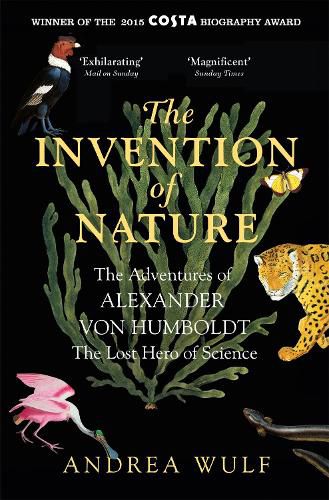Readings Newsletter
Become a Readings Member to make your shopping experience even easier.
Sign in or sign up for free!
You’re not far away from qualifying for FREE standard shipping within Australia
You’ve qualified for FREE standard shipping within Australia
The cart is loading…






Winner of the 2015 Costa Biography Award
Alexander von Humboldt (1769-1859) is the great lost scientist: more things are named after him than anyone else. There are towns, rivers, mountain ranges, the ocean current that runs along the South American coast, there’s a penguin, a giant squid - even the Mare Humboldtianum on the moon. His colourful adventures read like something out of a Boy’s Own story: Humboldt explored deep into the rainforest, climbed the world’s highest volcanoes and inspired princes and presidents, scientists and poets alike. Napoleon was jealous of him; Simon Bolivar’s revolution was fuelled by his ideas; Darwin set sail on the Beagle because of Humboldt; and Jules Verne’s Captain Nemo owned all his many books. He simply was, as one contemporary put it, ‘the greatest man since the Deluge’.
Taking us on a fantastic voyage in his footsteps - racing across anthrax-infected Russia or mapping tropical rivers alive with crocodiles - Andrea Wulf shows why his life and ideas remain so important today.
Humboldt predicted human-induced climate change as early as 1800, and The Invention of Nature traces his ideas as they go on to revolutionize and shape science, conservation, nature writing, politics, art and the theory of evolution. He wanted to know and understand everything and his way of thinking was so far ahead of his time that it’s only coming into its own now. Alexander von Humboldt really did invent the way we see nature.
$9.00 standard shipping within Australia
FREE standard shipping within Australia for orders over $100.00
Express & International shipping calculated at checkout
Winner of the 2015 Costa Biography Award
Alexander von Humboldt (1769-1859) is the great lost scientist: more things are named after him than anyone else. There are towns, rivers, mountain ranges, the ocean current that runs along the South American coast, there’s a penguin, a giant squid - even the Mare Humboldtianum on the moon. His colourful adventures read like something out of a Boy’s Own story: Humboldt explored deep into the rainforest, climbed the world’s highest volcanoes and inspired princes and presidents, scientists and poets alike. Napoleon was jealous of him; Simon Bolivar’s revolution was fuelled by his ideas; Darwin set sail on the Beagle because of Humboldt; and Jules Verne’s Captain Nemo owned all his many books. He simply was, as one contemporary put it, ‘the greatest man since the Deluge’.
Taking us on a fantastic voyage in his footsteps - racing across anthrax-infected Russia or mapping tropical rivers alive with crocodiles - Andrea Wulf shows why his life and ideas remain so important today.
Humboldt predicted human-induced climate change as early as 1800, and The Invention of Nature traces his ideas as they go on to revolutionize and shape science, conservation, nature writing, politics, art and the theory of evolution. He wanted to know and understand everything and his way of thinking was so far ahead of his time that it’s only coming into its own now. Alexander von Humboldt really did invent the way we see nature.